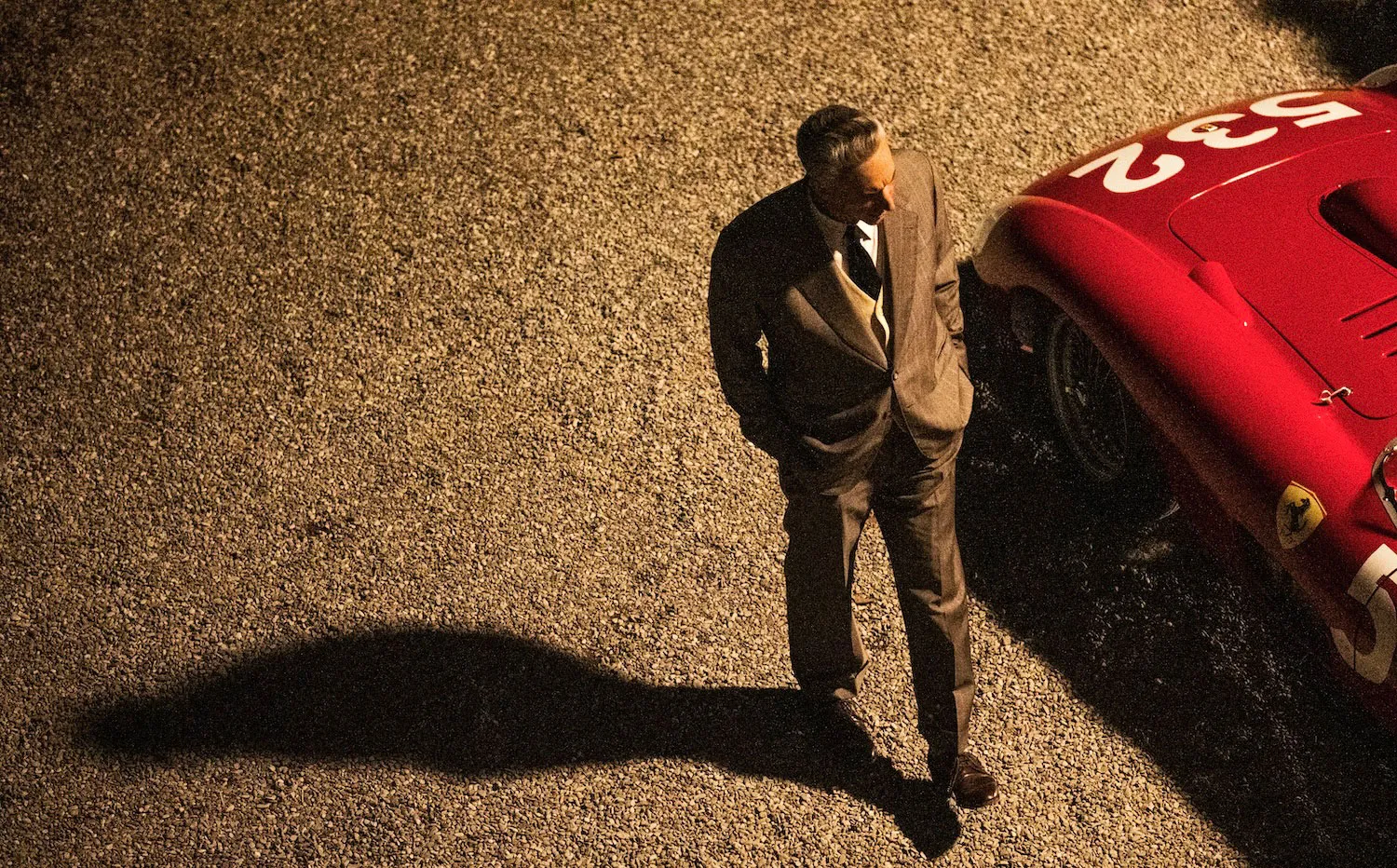
Enzo Ferrari’s son, Alfredo Dino Ferrari, died just before the events depicted in Ferrari begin. This information is in the film, but it isn’t presented in an emphatic way. (We briefly see the dates on his tombstone a few minutes after being told what year it is via on-screen text.) I can’t figure out why. It’s an essential piece of information for following what happens in the film. Enzo Ferrari and his wife, Laura, are experiencing raw, unthinkable grief. It motivates everything they do.
It is strange for director Michael Mann to even come close to burying the motivation of his main characters. Mann’s men know exactly what they want, or at least they think they do, and they articulate it to a person they want to love them, usually over a cup of coffee, occasionally over a cocktail. But none of Mann’s men have ever had grief as their prime motivation before. Perhaps grief like this destroys all other desires. Maybe Enzo and Laura don’t want anything other than to have their son back.
The loss of their son has striped away the veneer they had spread over issues in their life together. Now everything broken in their lives is obvious. Their marriage and their business are barely surviving. Enzo hopes to save his motor company by winning the upcoming Mille Miglia, a thousand-mile race through rural Italy. He believes the publicity will increase his car sales and make his company attractive to a new partner, like Ford or Fiat. He already has another romantic partner. Enzo has been having an extramarital affair for the past decade with Lina Lardi. They have a teenage son named Piero, who is now Enzo’s only living heir. He is spending more and more time at their house, much to Laura’s resentment as she is left alone in her grief.
Mann’s protagonists* are always haunted by time. They feel it running out – the inevitability of their freedom, if not life itself, being taken away from them. In Ferrari, the end has caught up to Mann’s protagonist before the movie begins, but Enzo is in denial. Like Mann’s other protagonists, he hopes that moving fast will let him evade death. Ferrari is about him accepting that death has been his navigator this whole time.
Ferrari is an elegiac film, but through mourning, we find hope. We go down to the grave, but the Lord brings us up. Mourning lasts through the night, but joy comes in the morning. I’m not sure Enzo knows that. He attends mass, but his real church is the racetrack. Even his priest’s homily are geared a little too strongly toward Ferrari’s autoworkers. I need to hear it again, but I don’t think it offers much consolation or hope.
In Mann’s films, I have often found the consolation of recognizing that someone else feels as I do about the tensions we endure in contemporary society – the breakneck pace of life; the ways advertising influences our desires; the impossibility of living up to conventional expectations of masculinity; the Jupiter-like crunch of Capitalism; the fleeting ecstasy of romance; the solace of aesthetic pleasures; the satisfaction of being allowed to do a job to the best of your ability; the existential weight of life’s brevity. The end of Mann’s films are often haunted. The tensions remain unresolved, but life continues. Perhaps an answer is out there somewhere as Mann’s men continue into the dawn.
I hope Ferrari isn’t Mann’s last film. He is eighty years old, and it’s been a decade since his last film. And as he has always showed us, swift though we may race, we are all eventually caught in time’s net. But if Ferrari is his last film, I am glad it is ultimately hopeful – as inevitable as death is, life after death is certain as well. It would be a welcome coda to a career of filmmaking that has meant so much to me.
*Mann’s protagonists are always consummate professionals too, adept at using the tools of their trade. Enzo Ferrari’s tools are the news media and his stable of drivers. The movie spends a lot of time showing how good Enzo is at directing them. There’s a touch of Fellini’s 8 1/2 to this film.
Enzo Ferrari’s son, Alfredo Dino Ferrari, died just before the events depicted in Ferrari begin. This information is in the film, but it isn’t presented in an emphatic way. (We briefly see the dates on his tombstone a few minutes after being told what year it is via on-screen text.) I can’t figure out why. It’s an essential piece of information for following what happens in the film. Enzo Ferrari and his wife, Laura, are experiencing raw, unthinkable grief. It motivates everything they do.
It is strange for director Michael Mann to even come close to burying the motivation of his main characters. Mann’s men know exactly what they want, or at least they think they do, and they articulate it to a person they want to love them, usually over a cup of coffee, occasionally over a cocktail. But none of Mann’s men have ever had grief as their prime motivation before. Perhaps grief like this destroys all other desires. Maybe Enzo and Laura don’t want anything other than to have their son back.
The loss of their son has striped away the veneer they had spread over issues in their life together. Now everything broken in their lives is obvious. Their marriage and their business are barely surviving. Enzo hopes to save his motor company by winning the upcoming Mille Miglia, a thousand-mile race through rural Italy. He believes the publicity will increase his car sales and make his company attractive to a new partner, like Ford or Fiat. He already has another romantic partner. Enzo has been having an extramarital affair for the past decade with Lina Lardi. They have a teenage son named Piero, who is now Enzo’s only living heir. He is spending more and more time at their house, much to Laura’s resentment as she is left alone in her grief.
Mann’s protagonists* are always haunted by time. They feel it running out – the inevitability of their freedom, if not life itself, being taken away from them. In Ferrari, the end has caught up to Mann’s protagonist before the movie begins, but Enzo is in denial. Like Mann’s other protagonists, he hopes that moving fast will let him evade death. Ferrari is about him accepting that death has been his navigator this whole time.
Ferrari is an elegiac film, but through mourning, we find hope. We go down to the grave, but the Lord brings us up. Mourning lasts through the night, but joy comes in the morning. I’m not sure Enzo knows that. He attends mass, but his real church is the racetrack. Even his priest’s homily are geared a little too strongly toward Ferrari’s autoworkers. I need to hear it again, but I don’t think it offers much consolation or hope.
In Mann’s films, I have often found the consolation of recognizing that someone else feels as I do about the tensions we endure in contemporary society – the breakneck pace of life; the ways advertising influences our desires; the impossibility of living up to conventional expectations of masculinity; the Jupiter-like crunch of Capitalism; the fleeting ecstasy of romance; the solace of aesthetic pleasures; the satisfaction of being allowed to do a job to the best of your ability; the existential weight of life’s brevity. The end of Mann’s films are often haunted. The tensions remain unresolved, but life continues. Perhaps an answer is out there somewhere as Mann’s men continue into the dawn.
I hope Ferrari isn’t Mann’s last film. He is eighty years old, and it’s been a decade since his last film. And as he has always showed us, swift though we may race, we are all eventually caught in time’s net. But if Ferrari is his last film, I am glad it is ultimately hopeful – as inevitable as death is, life after death is certain as well. It would be a welcome coda to a career of filmmaking that has meant so much to me.
*Mann’s protagonists are always consummate professionals too, adept at using the tools of their trade. Enzo Ferrari’s tools are the news media and his stable of drivers. The movie spends a lot of time showing how good Enzo is at directing them. There’s a touch of Fellini’s 8 1/2 to this film.

Elijah Davidson is Co-Director of Brehm Film and Senior Film Critic. Subscribe to Come & See, his weekly newsletter that guides you through the greatest films ever made, and find more of his work at elijahdavidson.com.
The Boy and the Heron is an old man’s film, thick with grievances, guided by questions, punctuated with answers that feel more like observations unrelated to the questions but somehow conciliatory nonetheless.